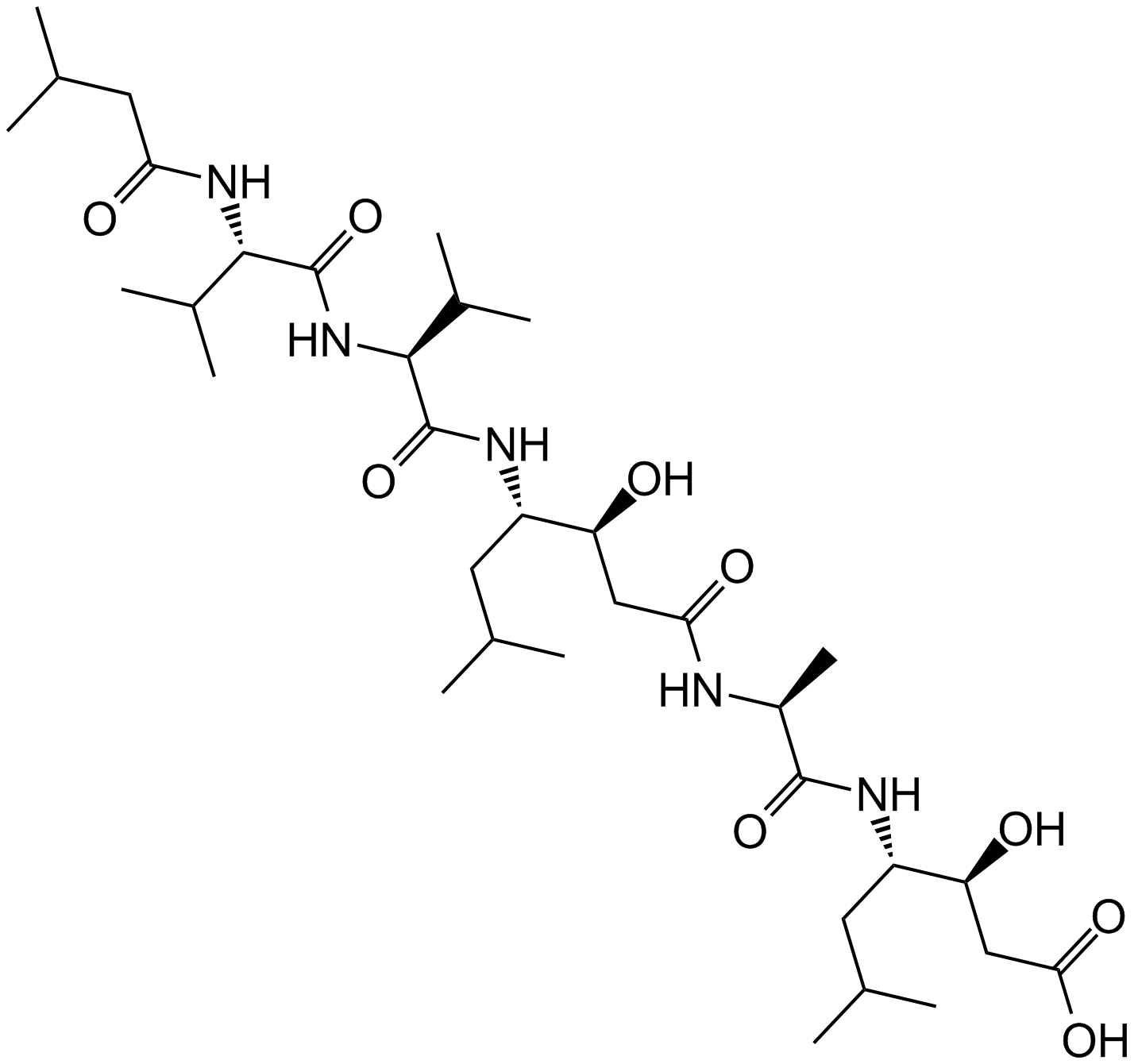Pepstatin A (Synonyms: NSC 272671, Pepsin Inhibitor S 735A) |
| Catalog No.GC11974 |
Pepstatin A is an orally active inhibitor of aspartic proteases, which is produced by actinomycetes.
Products are for research use only. Not for human use. We do not sell to patients.

Cas No.: 26305-03-3
Sample solution is provided at 25 µL, 10mM.
Pepstatin A is an orally active inhibitor of aspartic proteases, which is produced by actinomycetes. It exhibits inhibitory activity with IC50 values of 4.5 nM, 6.2 nM, 150 nM, 290 nM, 520 nM, and 260 nM against hemoglobin-pepsin, hemoglobin-proctase, casein-pepsin, casein-proctase, casein-acid protease, and hemoglobin-acid protease, respectively. Additionally, pepstatin has been found to inhibit HIV protease [1-3].
Pepstatin A(0-120 µM) suppressed receptor activator of NF-κB ligand (RANKL)-induced osteoclast differentiation[4]. Pepstatin A(0.1-0.3 µM) caused a reproducible, concentration-related increase in the extracellular acidification rate in two microglial cell lines, Ra2 and 6-3[5]. Pepstatin A significantly hindered influenza virus replication, probably by modulating host cell autophagic/apoptotic responses[6].
Pepstatin (0.5-50 mg/kg; p.o.) suppresses stomach ulceration of the pylorus in ligated Shay rats[1].
References:
[1]. Yoshida H, Okamoto K, et,al. Pepstatin A, an aspartic proteinase inhibitor, suppresses RANKL-induced osteoclast differentiation. J Biochem. 2006 Mar;139(3):583-90. doi: 10.1093/jb/mvj066. PMID: 16567424.
[2]. Seelmeier S, Schmidt H, et,al. Human immunodeficiency virus has an aspartic-type protease that can be inhibited by pepstatin A. Proc Natl Acad Sci U S A. 1988 Sep;85(18):6612-6. doi: 10.1073/pnas.85.18.6612. PMID: 3045820; PMCID: PMC282027.
[3]. Seelmeier S, Schmidt H, et,al. Human immunodeficiency virus has an aspartic-type protease that can be inhibited by pepstatin A. Proc Natl Acad Sci U S A. 1988 Sep;85(18):6612-6. doi: 10.1073/pnas.85.18.6612. PMID: 3045820; PMCID: PMC282027.
[4]. Yoshida H, Okamoto K, et,al.Pepstatin A, an aspartic proteinase inhibitor, suppresses RANKL-induced osteoclast differentiation. J Biochem. 2006 Mar;139(3):583-90. doi: 10.1093/jb/mvj066. PMID: 16567424.
[5]. Okada M, Irie S, S et,al. Pepstatin A induces extracellular acidification distinct from aspartic protease inhibition in microglial cell lines. Glia. 2003 Aug;43(2):167-74. doi: 10.1002/glia.10237. PMID: 12838508.
[6]. Matarrese P, Nencioni L, et,al. Pepstatin A alters host cell autophagic machinery and leads to a decrease in influenza A virus production. J Cell Physiol. 2011 Dec;226(12):3368-77. doi: 10.1002/jcp.22696. PMID: 21344392.
Average Rating: 5 (Based on Reviews and 30 reference(s) in Google Scholar.)
GLPBIO products are for RESEARCH USE ONLY. Please make sure your review or question is research based.
Required fields are marked with *




